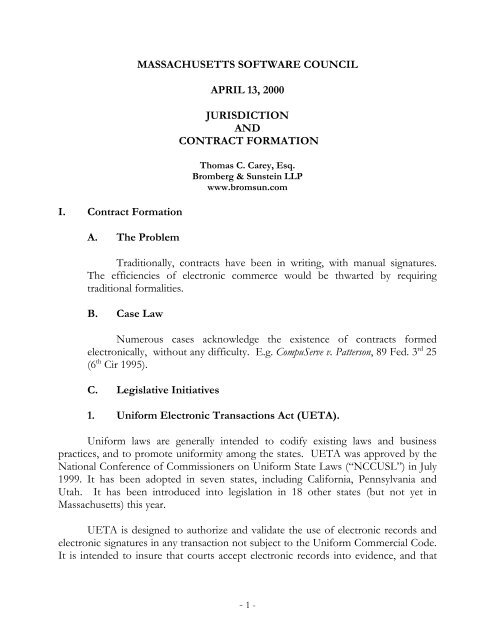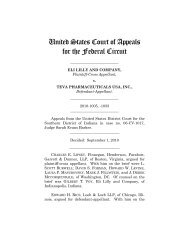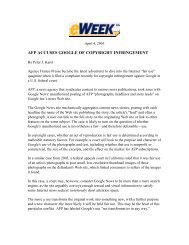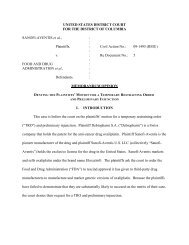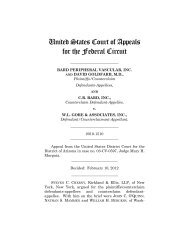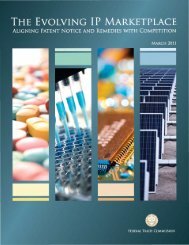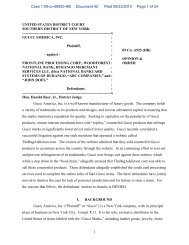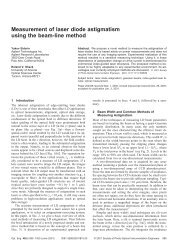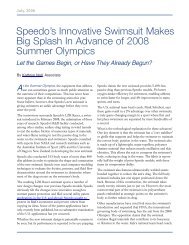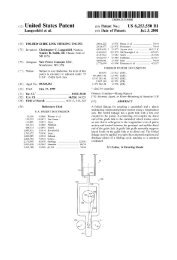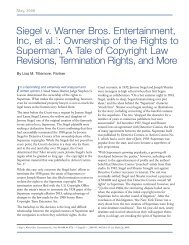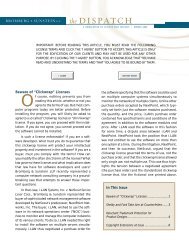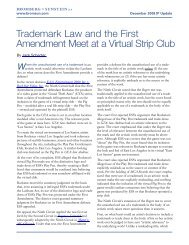Jurisdiction and Contract Formation
Jurisdiction and Contract Formation
Jurisdiction and Contract Formation
You also want an ePaper? Increase the reach of your titles
YUMPU automatically turns print PDFs into web optimized ePapers that Google loves.
I. <strong>Contract</strong> <strong>Formation</strong><br />
A. The Problem<br />
MASSACHUSETTS SOFTWARE COUNCIL<br />
APRIL 13, 2000<br />
JURISDICTION<br />
AND<br />
CONTRACT FORMATION<br />
Thomas C. Carey, Esq.<br />
Bromberg & Sunstein LLP<br />
www.bromsun.com<br />
Traditionally, contracts have been in writing, with manual signatures.<br />
The efficiencies of electronic commerce would be thwarted by requiring<br />
traditional formalities.<br />
B. Case Law<br />
Numerous cases acknowledge the existence of contracts formed<br />
electronically, without any difficulty. E.g. CompuServe v. Patterson, 89 Fed. 3 rd 25<br />
(6 th Cir 1995).<br />
C. Legislative Initiatives<br />
1. Uniform Electronic Transactions Act (UETA).<br />
Uniform laws are generally intended to codify existing laws <strong>and</strong> business<br />
practices, <strong>and</strong> to promote uniformity among the states. UETA was approved by the<br />
National Conference of Commissioners on Uniform State Laws (“NCCUSL”) in July<br />
1999. It has been adopted in seven states, including California, Pennsylvania <strong>and</strong><br />
Utah. It has been introduced into legislation in 18 other states (but not yet in<br />
Massachusetts) this year.<br />
UETA is designed to authorize <strong>and</strong> validate the use of electronic records <strong>and</strong><br />
electronic signatures in any transaction not subject to the Uniform Commercial Code.<br />
It is intended to insure that courts accept electronic records into evidence, <strong>and</strong> that<br />
- 1 -
contracts <strong>and</strong> transactions are not denied enforcement because electronic media are<br />
used.<br />
2. Uniform Computer Information Transactions Act (“UCITA”)<br />
UCITA is a uniform “computer information” licensing law It has been enacted<br />
in Virginia <strong>and</strong> introduced into legislation in six additional states so far this year. Key<br />
UCITA provisions discussed below are attached as an exhibit to this outline.<br />
2.1 Scope<br />
UCITA establishes rules for contracts about “computer information”, <strong>and</strong><br />
covers the following subjects, among others:<br />
(a) creating electronic contracts;<br />
(b) using electronic signatures for contract adoption;<br />
(c) licensing “computer information”, which is defined to include both<br />
software <strong>and</strong> other forms of electronic information, such as databases;<br />
(d) utilizing access contracts governing access to sites containing computer<br />
information, whether on or off the Internet.<br />
2.2 General drafting principles<br />
Most of the rules of UCITA are “default” rules, meaning they may be waived<br />
or varied by contract. This allows contracting parties wide latitude to shape contracts<br />
as they wish. The exceptions to this flexibility is that rules relating to the fairness of<br />
the contracting process cannot be disclaimed. Examples of such rules are the<br />
obligations of good faith, diligence, reasonableness, unconscienability, fundamental<br />
public policy, <strong>and</strong> st<strong>and</strong>ards of care prescribed by UCITA. Express consumer<br />
protection rules generally may not be disclaimed.<br />
2.3 Licensing of “Copies” of Computer Information<br />
UCITA focuses on the rules for licensing computer information. UCITA<br />
offers licensors of computer information the ability to rely on protections contained<br />
in licensing contracts because the UCITA drafters anticipate the need to restrict<br />
copying of computer information so as to preserve its value.<br />
- 2 -
UCITA defines “copy” as the “medium on which information is fixed on a<br />
temporary or permanent basis <strong>and</strong> from which it can be perceived, reproduced, used<br />
or communicated…” Transfer of a copy is the basis of a licensing transaction.<br />
UCITA distinguishes transfer of a copy from transfer of ownership of the<br />
informational rights. Each may be transferred separately. UCITA deals primarily<br />
with transfers of copies, leaving to other forms of intellectual property law the<br />
transfer of the underlying informational rights. License terms made available using the<br />
internet or similar electronic sites are enforceable if the licensor complies with<br />
procedural provisions designed to make sure that the licensee has the opportunity to<br />
review the license before agreeing to it. In addition, the licensor must not take<br />
affirmative acts to prevent the printing or storage of the st<strong>and</strong>ard terms by the<br />
licensee.<br />
2.3 Mass Market Licenses<br />
UCITA defines <strong>and</strong> separately regulates “mass market licenses.” Mass market<br />
licenses are defined as licenses sold to consumers in circumstances not permitting<br />
variation in their terms. A mass market license is enforceable only if the licensee has<br />
access to the license terms <strong>and</strong> has had an appropriate time to review them before<br />
agreeing to them by, for example clicking a button on a computer screen. If the<br />
licensee, during its review period, does not like the license contract or any part of it,<br />
she can return the copy of the computer information to the vendor for a refund, plus<br />
reasonable expenses for making a rightful return <strong>and</strong> compensation for any damages<br />
caused to her processing system by the removal of the information from that system.<br />
This consumer protection provision cannot be waived or disclaimed by contract.<br />
2.4 Electronic Agents<br />
UCITA specifically recognizes <strong>and</strong> authorizes the role of “electronic agents” in<br />
contract formation. 1 <strong>Contract</strong>s may be formed between a person <strong>and</strong> the electronic<br />
agent of another person; or between two electronic agents on behalf of their owners.<br />
Section 206. Section 107(d) states that “a person that uses an electronic agent that he<br />
has selected from making an authentication, performance or agreement… is bound by<br />
the operations of the electronic agent, even if no individual was aware of or reviewed<br />
the agent’s operations or the results of the operations.” An electronic agent may be<br />
deemed to have reviewed the terms of an electronic record (such as a contract) “only<br />
1 "Electronic agent" means a computer program, or electronic or other automated means, used by a<br />
person to initiate an action, or to respond to electronic messages or performances, on the person’s<br />
behalf without review or action by an individual at the time of the action or response to the message<br />
or performance.<br />
- 3 -
if it is made available in a manner that would enable a reasonably configured<br />
electronic agent to react to the record or term.”<br />
2.5 Statute of Frauds<br />
UCITA has its own version of the statute of frauds applicable to contracts requiring<br />
the payment of a contract fee of $5,000 or more. Such a contract is generally<br />
enforceable only if the party against which enforcement is sought authenticated a<br />
record sufficient to indicate that a contract had been formed. Section 201(a)(1).<br />
“Authentication” is defined to include the adoption of an electronic symbol, sound,<br />
message or process, referring to, attached to, included in, or logically associated or<br />
linked with the record to be signed. Authentication may be performed by an<br />
electronic agent. Between merchants, a record in confirmation of a contract not<br />
authenticated by the recipient will bind the recipient if he has reason to know its<br />
contents, <strong>and</strong> the merchant does not object within ten days of receipt of the<br />
confirmation.<br />
3. OECD Consumer Protection Guidelines<br />
UCITA has been criticized for not being protective enough of the rights of<br />
consumers. The OECD has recommended that its members implement guidelines<br />
that stress the rights of consumers. For example, the guidelines state that “consumers<br />
who participate in electronic commerce should be afforded transparent <strong>and</strong> effective<br />
consumer protection that is not less than the level of protection afforded in other<br />
forms of commerce.” The guidelines also state that businesses engaged in electronic<br />
commerce with consumers should provide disclosure about themselves, <strong>and</strong> provide<br />
appropriate <strong>and</strong> effective resolution of disputes; information concerning service of<br />
legal process; <strong>and</strong> the location of the business <strong>and</strong> its principals. The guidelines state<br />
that consumers should be provided meaningful access to fair <strong>and</strong> timely ADR without<br />
undue cost or burden. The guidelines endorse the OECD ministerial declaration on<br />
the protection of privacy on global networks (1998) <strong>and</strong> the OECD guidelines<br />
governing the protection of privacy <strong>and</strong> transport law of personal data (1980).<br />
- 4 -
II.<br />
<strong>Jurisdiction</strong><br />
A. General Principles of <strong>Jurisdiction</strong><br />
<strong>Jurisdiction</strong> in the United States has generally focused on the contacts between the<br />
defendant, the forum <strong>and</strong> the litigation. The defendant must have “minimum<br />
contacts” with the forum such that an assertion of jurisdiction does not offend<br />
traditional notions of fair-play <strong>and</strong> substantial justice. The doctrine of “minimum<br />
contacts” is now equated with the requirement with the defendant acted purposely to<br />
connect himself with a foreign state. This may occur by introducing products into the<br />
“stream of commerce” in a way that foreseeably results in products being sold by the<br />
defendant in that jurisdiction. <strong>Jurisdiction</strong> may be also based upon acts occurring in<br />
another jurisdiction that are directed to the forum <strong>and</strong> cause harm there.<br />
<strong>Jurisdiction</strong> may be “specific” or “general.” Specific jurisdiction occurs when<br />
the claim is based upon the activity of the defendant that is connected with the<br />
foreign state. General jurisdiction occurs when there is no such connection. General<br />
jurisdiction requires a greater degree of “presence” in the foreign state.<br />
B. The Problem<br />
Internet <strong>and</strong> other electronic transactions take place without physical presence<br />
in the place where the activity may have significant effects. In many cases, No<br />
physical goods are shipped into the jurisdiction by the Web site owner. When is it fair<br />
<strong>and</strong> appropriate to assert jurisdiction<br />
C. Case Law<br />
1. Early Cases<br />
Early case law suggested that the mere maintenance of a website exposed the<br />
website owner to jurisdiction in every state in the country, <strong>and</strong> in every country in the<br />
world, since the website could be viewed from anywhere. E.g., Inset Systems, Inc. v.<br />
Instruction Set, Inc., 937 F.Supp., 161, 164 (D. Conn. 1996).<br />
2. Recent Case Law<br />
Current case law often refers to the analytical framework established in Zippo<br />
Manufacturing Co. v. Zippo.com, Inc., 952 F.Supp. 119 (WD Pa 1997). There, the court<br />
stated that there was a continuum, the extremes of which were a passive website used<br />
- 5 -
only for advertising purposes, which would not likely ever to be a basis for asserting<br />
jurisdiction; <strong>and</strong>, at the other end, a website actively used for the conduct of<br />
commercial transactions, including transactions involving the state in which<br />
jurisdiction is asserted. In the latter case, jurisdiction would be appropriate.<br />
Zippo stated that, in the middle, <strong>and</strong> subject to a more detailed analysis, were<br />
websites involving some level of interactivity with the users in the state where<br />
jurisdiction is asserted. According to Zippo, “the likelihood that personal jurisdiction<br />
can be constitutionally exercised is directly proportional to the nature <strong>and</strong> quality of<br />
commercial activity that an entity conducts on the internet.” Id. at 1124.<br />
Following that analysis, cases have held the owner of a website to be subject to<br />
the jurisdiction of a foreign state in the following circumstances:<br />
1. Website includes a “contact” page on which users can send email to<br />
website owner <strong>and</strong> also join its mailing list. The page also provides the<br />
owner’s address, phone number <strong>and</strong> fax number. Twenty-five residents<br />
of Illinois had been requested to be placed on the mailing list. The<br />
owner created the mailing list for the purpose of developing contacts<br />
with the users, seeking to provide a feeling of community, of “internet<br />
neighborhood” so as to develop loyalty to the website, a web portal.<br />
LFG, LLC v. Zapata Corporation, (___ F. Supp. 2 nd ___ D Ill. 1999).<br />
2. Owner of a computer hardware company based in New Mexico<br />
maintains a website promoting <strong>and</strong> advertising his company. Although<br />
the website is “interactive in several ways,” no sales are concluded<br />
through it. Website owner also advertises specific computers on internet<br />
news groups. Court finds owner to be subject to the general jurisdiction<br />
of the courts of Virginia for the purposes of a defamation action based<br />
upon inflammatory postings on news groups discussing the sexual<br />
preferences of the author of a book on the JFK assassination. Bocon v.<br />
Lafontaine, ___ F.Supp. ___ (ED Va 1999).<br />
3. Furniture manufacturer shipping over $5.7 million worth of products to<br />
Texas residents <strong>and</strong> conducting direct mailing to Texas residents<br />
maintains a website that is “accessible to approximately 2.2 million<br />
Texans.” The court concludes that the maintenance of the website, in<br />
combination with the other business transactions in Texas, is sufficient<br />
to subject the manufacturer to jurisdiction in Texas. Mieczkowski v.<br />
Masco Corporation, 997 F. Supp. 782 (ED Tex. 1998).<br />
- 6 -
4. Advertising a cigar humidor on a website, plus the sale of 12 humidors<br />
into Massachusetts, plus plans to sell in quantity to a pharmacy chain<br />
were sufficient to establish jurisdiction for trademark infringement.<br />
Gayless Scott International, Inc. v. Baroudi, 981 Mass. 714, (d. Mass<br />
1997).<br />
The following facts were deemed not sufficient to support jurisdiction, following the<br />
Zippo analysis:<br />
1. Posting a warning on an America-On-Line bulletin board concerning<br />
prosecution of patent infringers was not sufficient to establish<br />
jurisdiction in the District of Columbia. Mallianckordt Nautica, Inc. v.<br />
Sonus Pharmaceuticals, Inc., 1998 WL 6546 (DDC 1998).<br />
2. An Arizona email spammer registers a trademark. A Florida corporation<br />
establishes a website using the spammer’s name. The maintenance of a<br />
passive website does not subject the website owner to jurisdiction in<br />
Arizona. Cybersell, Inc. v. Cybersell, Inc., 130 Fed. 3rd 414 (9th Cir.<br />
1997).<br />
3. Maintenance of a yellow pages website is insufficient to subject the<br />
defendant to personal jurisdiction in a foreign state. GTE New Media<br />
Services, Inc. v. Bell South Corp., 199 Fed. 3rd 1343 (DC Cir. 2000).<br />
4. Website provides printable mail-in order form <strong>and</strong> defendant’s toll-free<br />
number <strong>and</strong> email address. No jurisdiction. Minck v. AAAA<br />
Development LLC, 190 Fed. 3rd 333 (5th Cir. 1999).<br />
5. Website includes email buttons enabling user to obtain information<br />
about the defendant <strong>and</strong> a customer service page that allows a user to<br />
interact with customer service representatives. Lasalle National Bank v.<br />
Vitro, 2000 USD Lexis 1771 (February 14, 2000).<br />
6. Website allowing customers to print out order forms is not enough. Ty<br />
v. Max Clark, 2000 Lexis 283 (dl 2000).<br />
7. Maintenance of a website allowing customers to book hotel reservation<br />
insufficient to establish jurisdiction for a personal injury claim for<br />
injuries sustained at the hotel. Degasse v. Plant Hotel, 2000 Lexis 1073<br />
(DNH January 5, 2000).<br />
8. Small number of beer sales initiated from web site in-state not enough.<br />
Butler v. Beer Across America, 83 Fed. Supp. 2nd 1261 (d. Alabama<br />
2000).<br />
- 7 -
D. The Next Wave<br />
It is likely that courts will shift their attention from “the degree of interactivity”<br />
discussed in Zippo to the extent to which the website owner directs its actions towards<br />
the state where jurisdiction is sought. This shift in focus has begun to occur. E.g.,<br />
Molmlycke Healthcare AB v. Dumex Medical Surgical Products Limited, (ED Pa 1999); Cold<br />
Studios, Inc. v. Bad Puppy Enterprises (CD Cal 1999).<br />
This concept has also been central to a recent SEC interpretation (Use of an<br />
Internet Website to Offer Securities, Solicit Securities Transactions or Advertisement<br />
Investment Services Offshore (SEC. Rel. No. 33-77516, March 23, 1988).<br />
In that release, the SEC has taken the position that securities offerings not<br />
targeted at the United States would not be deemed as occurring in the United States<br />
for Securities Act registration purposes. The SEC stated that it would generally not<br />
consider an offer to be targeted at the United States if:<br />
(a)<br />
(b)<br />
the website includes a prominent disclaimer making it clear that the<br />
offer is directed only to countries other than the United States;<br />
the website implements procedures reasonably designed to guard<br />
against sales to United States persons in the offshore offering.<br />
Checking of mailing addresses <strong>and</strong> telephone numbers or area codes<br />
were specifically suggested as a safeguard.<br />
E. EU Law<br />
The European Union has issued a Data Protection Directive that allows<br />
consumers of EU member states to view <strong>and</strong> update their personal information held<br />
by other entities. This suggests the possibility of nearly all website operators<br />
collecting data on EU residents may be subject to jurisdiction in EU courts. Those<br />
entities collecting the data, furthermore, may even have to reorganize or separate their<br />
databases to accommodate the policies of the directive.<br />
- 8 -
UNIFORM COMPUTER INFORMATION<br />
TRANSACTIONS ACT<br />
PART 1<br />
GENERAL PROVISIONS<br />
[SUBPART A. SHORT TITLE AND DEFINITIONS]<br />
SECTION 101. SHORT TITLE. This [Act] may be cited as the Uniform Computer Information<br />
Transactions Act.<br />
SECTION 102. DEFINITIONS.<br />
(a) In this [Act]:<br />
(1) "Access contract" means a contract to obtain by electronic means access to, or information from,<br />
an information processing system of another person, or the equivalent of such access.<br />
(2) "Access material" means any information or material, such as a document, address, or access<br />
code, that is necessary to obtain authorized access to information or control or possession of a copy.<br />
…<br />
(4) "Agreement" means the bargain of the parties in fact as found in their language or by implication<br />
from other circumstances, including course of performance, course of dealing, <strong>and</strong> usage of trade as<br />
provided in this [Act].<br />
(5) "Attribution procedure" means a procedure to verify that an electronic authentication, display,<br />
message, record, or performance is that of a particular person or to detect changes or errors in<br />
information. The term includes a procedure that requires the use of algorithms or other codes,<br />
identifying words or numbers, encryption, or callback or other acknowledgment.<br />
(6) "Authenticate" means:<br />
(A) to sign; or<br />
(B) with the intent to sign a record, otherwise to execute or adopt an electronic symbol, sound,<br />
message, or process referring to, attached to, included in, or logically associated or linked with, that<br />
record.<br />
(7) "Automated transaction" means a transaction in which a contract is formed in whole or part by<br />
electronic actions of one or both parties which are not previously reviewed by an individual in the<br />
ordinary course.<br />
….<br />
(9) "Computer" means an electronic device that accepts information in digital or similar form <strong>and</strong><br />
manipulates it for a result based on a sequence of instructions.<br />
(10) "Computer information" means information in electronic form which is obtained from or<br />
through the use of a computer or which is in a form capable of being processed by a computer. The<br />
term includes a copy of the information <strong>and</strong> any documentation or packaging associated with the<br />
copy.<br />
(11) "Computer information transaction" means an agreement or the performance of it to create,<br />
modify, transfer, or license computer information or informational rights in computer information.<br />
…. The term does not include a transaction merely because the parties’ agreement provides that<br />
their communications about the transaction will be in the form of computer information.<br />
- 9 -
(12) "Computer program" means a set of statements or instructions to be used directly or indirectly<br />
in a computer to bring about a certain result. The term does not include separately identifiable<br />
informational content.<br />
….<br />
(15) "Consumer" means an individual who is a licensee of information or informational rights that<br />
the individual at the time of contracting intended to be used primarily for personal, family, or<br />
household purposes. The term does not include an individual who is a licensee primarily for<br />
professional or commercial purposes, including agriculture, business management, <strong>and</strong> investment<br />
management other than management of the individual’s personal or family investments.<br />
(16) "Consumer contract" means a contract between a merchant licensor <strong>and</strong> a consumer.<br />
(17) "<strong>Contract</strong>" means the total legal obligation resulting from the parties’ agreement as affected by<br />
this [Act] <strong>and</strong> other applicable law.<br />
…<br />
(20) "Copy" means the medium on which information is fixed on a temporary or permanent basis<br />
<strong>and</strong> from which it can be perceived, reproduced, used, or communicated, either directly or with the<br />
aid of a machine or device.<br />
…<br />
(27) "Electronic agent" means a computer program, or electronic or other automated means, used<br />
by a person to initiate an action, or to respond to electronic messages or performances, on the<br />
person’s behalf without review or action by an individual at the time of the action or response to the<br />
message or performance.<br />
…<br />
(38) "Informational rights" include all rights in information created under laws governing patents,<br />
copyrights, mask works, trade secrets, trademarks, publicity rights, or any other law that gives a<br />
person, independently of contract, a right to control or preclude another person’s use of or access to<br />
the information on the basis of the rights holder’s interest in the information.<br />
….<br />
(40) "License" means a contract that authorizes access to, or use, distribution, performance,<br />
modification, or reproduction of, information or informational rights, but expressly limits the access<br />
or uses authorized or expressly grants fewer than all rights in the information, whether or not the<br />
transferee has title to a licensed copy. The term includes an access contract, a lease of a computer<br />
program, <strong>and</strong> a consignment of a copy. The term does not include a reservation or creation of a<br />
security interest to the extent the interest is governed by [Article 9 of the Uniform Commercial<br />
Code].<br />
…<br />
(43) "Mass-market license" means a st<strong>and</strong>ard form used in a mass-market transaction.<br />
(44) "Mass-market transaction" means a transaction that is:<br />
(A) a consumer contract; or<br />
(B) any other transaction with an end-user licensee if:<br />
(i) the transaction is for information or informational rights directed to the general public as a whole,<br />
including consumers, under substantially the same terms for the same information;<br />
(ii) the licensee acquires the information or informational rights in a retail transaction under terms<br />
<strong>and</strong> in a quantity consistent with an ordinary transaction in a retail market; <strong>and</strong><br />
- 10 -
(iii) the transaction is not:<br />
(I) a contract for redistribution or for public performance or public display of a copyrighted work;<br />
(II) a transaction in which the information is customized or otherwise specially prepared by the<br />
licensor for the licensee, other than minor customization using a capability of the information<br />
intended for that purpose;<br />
(III) a site license; or<br />
(IV) an access contract.<br />
(45) "Merchant" means a person:<br />
(A) that deals in information or informational rights of the kind involved in the transaction;<br />
(B) that by the person’s occupation holds itself out as having knowledge or skill peculiar to the<br />
relevant aspect of the business practices or information involved in the transaction; or<br />
(C) to which the knowledge or skill peculiar to the practices or information involved in the<br />
transaction may be attributed by the person’s employment of an agent or broker or other<br />
intermediary that by its occupation holds itself out as having the knowledge or skill.<br />
…<br />
(51) "Published informational content" means informational content prepared for or made available<br />
to recipients generally, or to a class of recipients, in substantially the same form. The term does not<br />
include informational content that is:<br />
(A) customized for a particular recipient by one or more individuals acting as or on behalf of the<br />
licensor, using judgment or expertise; or<br />
(B) provided in a special relationship of reliance between the provider <strong>and</strong> the recipient.<br />
…<br />
(54) "Record" means information that is inscribed on a tangible medium or that is stored in an<br />
electronic or other medium <strong>and</strong> is retrievable in perceivable form.<br />
(55) "Release" means an agreement by a party not to object to, or exercise any rights or pursue any<br />
remedies to limit, the use of information or informational rights which agreement does not require<br />
an affirmative act by the party to enable or support the other party’s use of the information or<br />
informational rights. The term includes a waiver of informational rights.<br />
…<br />
[SUBPART B. GENERAL SCOPE AND TERMS]<br />
…<br />
SECTION 105. RELATION TO FEDERAL LAW; FUNDAMENTAL PUBLIC POLICY;<br />
TRANSACTIONS SUBJECT TO OTHER STATE LAW.<br />
(a) A provision of this [Act] which is preempted by federal law is unenforceable to the extent of the<br />
preemption.<br />
(b) If a term of a contract violates a fundamental public policy, the court may refuse to enforce the<br />
contract, enforce the remainder of the contract without the impermissible term, or limit the<br />
application of the impermissible term so as to avoid a result contrary to public policy, in each case to<br />
the extent that the interest in enforcement is clearly outweighed by a public policy against<br />
enforcement of the term.<br />
- 11 -
(c) Except as otherwise provided in subsection (d), if this [Act] or a term of a contract under this<br />
[Act] conflicts with a consumer protection statute [or administrative rule], the consumer protection<br />
statute [or rule] governs.<br />
(d) If a law of this State in effect on the effective date of this [Act] applies to a transaction governed<br />
by this [Act], the following rules apply:<br />
(1) A requirement that a term, waiver, notice, or disclaimer be in a writing is satisfied by a record.<br />
(2) A requirement that a record, writing, or term be signed is satisfied by an authentication.<br />
(3) A requirement that a term be conspicuous, or the like, is satisfied by a term that is conspicuous<br />
under this [Act].<br />
(4) A requirement of consent or agreement to a term is satisfied by a manifestation of assent to the<br />
term in accordance with this [Act].<br />
[(e) The following laws govern in the case of a conflict between this [Act] <strong>and</strong> the other law: [List<br />
laws establishing a digital signature <strong>and</strong> similar form of attribution procedure.]]<br />
Legislative Note: If there are any consumer protection laws that should be excepted from the<br />
electronic commerce rules in subsection (d), those laws should be excluded from the operation of<br />
that subsection.<br />
SECTION 106. RULES OF CONSTRUCTION.<br />
(a) This [Act] must be liberally construed <strong>and</strong> applied to promote its underlying purposes <strong>and</strong><br />
policies to:<br />
(1) support <strong>and</strong> facilitate the realization of the full potential of computer information transactions;<br />
(2) clarify the law governing computer information transactions;<br />
(3) enable exp<strong>and</strong>ing commercial practice in computer information transactions by commercial<br />
usage <strong>and</strong> agreement of the parties;<br />
(4) promote uniformity of the law with respect to the subject matter of this [Act] among States that<br />
enact it; <strong>and</strong><br />
(5) permit the continued expansion of commercial practices in the excluded transactions through<br />
custom, usage, <strong>and</strong> agreement of the parties.<br />
(b) Except as otherwise provided in Section 113(a), the use of m<strong>and</strong>atory language or the absence of<br />
a phrase such as "unless otherwise agreed" in a provision of this [Act] does not preclude the parties<br />
from varying the effect of the provision by agreement.<br />
(c) The fact that a provision of this [Act] imposes a condition for a result does not by itself mean<br />
that the absence of that condition yields a different result.<br />
(d) To be enforceable, a term need not be conspicuous, negotiated, or expressly assented or agreed<br />
to, unless this [Act] expressly so requires.<br />
SECTION 107. LEGAL RECOGNITION OF ELECTRONIC RECORD AND<br />
AUTHENTICATION; USE OF ELECTRONIC AGENTS.<br />
(a) A record or authentication may not be denied legal effect or enforceability solely because it is in<br />
electronic form.<br />
(b) This [Act] does not require that a record or authentication be generated, stored, sent, received, or<br />
otherwise processed by electronic means or in electronic form.<br />
- 12 -
(c) In any transaction, a person may establish requirements regarding the type of authentication or<br />
record acceptable to it.<br />
(d) A person that uses an electronic agent that it has selected for making an authentication,<br />
performance, or agreement, including manifestation of assent, is bound by the operations of the<br />
electronic agent, even if no individual was aware of or reviewed the agent’s operations or the results<br />
of the operations.<br />
SECTION 108. PROOF AND EFFECT OF AUTHENTICATION.<br />
(a) Authentication may be proven in any manner, including a showing that a party made use of<br />
information or access that could have been available only if it engaged in conduct or operations that<br />
authenticated the record or term.<br />
(b) Compliance with a commercially reasonable attribution procedure agreed to or adopted by the<br />
parties or established by law for authenticating a record authenticates the record as a matter of law.<br />
SECTION 109. CHOICE OF LAW.<br />
(a) The parties in their agreement may choose the applicable law. However, the choice is not<br />
enforceable in a consumer contract to the extent it would vary a rule that may not be varied by<br />
agreement under the law of the jurisdiction whose law would apply under subsections (b) <strong>and</strong> (c) in<br />
the absence of the agreement.<br />
(b) In the absence of an enforceable agreement on choice of law, the following rules determine<br />
which jurisdiction’s law governs in all respects for purposes of contract law:<br />
(1) An access contract or a contract providing for electronic delivery of a copy is governed by the<br />
law of the jurisdiction in which the licensor was located when the agreement was entered into.<br />
(2) A consumer contract that requires delivery of a copy on a tangible medium is governed by the<br />
law of the jurisdiction in which the copy is or should have been delivered to the consumer.<br />
(3) In all other cases, the contract is governed by the law of the jurisdiction having the most<br />
significant relationship to the transaction.<br />
(c) In cases governed by subsection (b), if the jurisdiction whose law governs is outside the United<br />
States, the law of that jurisdiction governs only if it provides substantially similar protections <strong>and</strong><br />
rights to a party not located in that jurisdiction as are provided under this [Act]. Otherwise, the law<br />
of the State that has the most significant relationship to the transaction governs.<br />
(d) For purposes of this section, a party is located at its place of business if it has one place of<br />
business, at its chief executive office if it has more than one place of business, or at its place of<br />
incorporation or primary registration if it does not have a physical place of business. Otherwise, a<br />
party is located at its primary residence.<br />
SECTION 110. CONTRACTUAL CHOICE OF FORUM.<br />
(a) The parties in their agreement may choose an exclusive judicial forum unless the choice is<br />
unreasonable <strong>and</strong> unjust.<br />
(b) A judicial forum specified in an agreement is not exclusive unless the agreement expressly so<br />
provides.<br />
…<br />
- 13 -
SECTION 112. MANIFESTING ASSENT; OPPORTUNITY TO REVIEW.<br />
(a) A person manifests assent to a record or term if the person, acting with knowledge of, or after<br />
having an opportunity to review the record or term or a copy of it:<br />
(1) authenticates the record or term with intent to adopt or accept it; or<br />
(2) intentionally engages in conduct or makes statements with reason to know that the other party or<br />
its electronic agent may infer from the conduct or statement that the person assents to the record or<br />
term.<br />
(b) An electronic agent manifests assent to a record or term if, after having an opportunity to review<br />
it, the electronic agent:<br />
(1) authenticates the record or term; or<br />
(2) engages in operations that in the circumstances indicate acceptance of the record or term.<br />
(c) If this [Act] or other law requires assent to a specific term, a manifestation of assent must relate<br />
specifically to the term.<br />
(d) Conduct or operations manifesting assent may be proved in any manner, including a showing<br />
that a person or an electronic agent obtained or used the information or informational rights <strong>and</strong><br />
that a procedure existed by which a person or an electronic agent must have engaged in the conduct<br />
or operations in order to do so. Proof of compliance with subsection (a)(2) is sufficient if there is<br />
conduct that assents <strong>and</strong> subsequent conduct that reaffirms assent by electronic means.<br />
(e) With respect to an opportunity to review, the following rules apply:<br />
(1) A person has an opportunity to review a record or term only if it is made available in a manner<br />
that ought to call it to the attention of a reasonable person <strong>and</strong> permit review.<br />
(2) An electronic agent has an opportunity to review a record or term only if it is made available in<br />
manner that would enable a reasonably configured electronic agent to react to the record or term.<br />
(3) If a record or term is available for review only after a person becomes obligated to pay or begins<br />
its performance, the person has an opportunity to review only if it has a right to a return if it rejects<br />
the record. However, a right to a return is not required if:<br />
(A) the record proposes a modification of contract or provides particulars of performance under<br />
Section 305; or<br />
(B) the primary performance is other than delivery or acceptance of a copy, the agreement is not a<br />
mass-market transaction, <strong>and</strong> the parties at the time of contracting had reason to know that a record<br />
or term would be presented after performance, use, or access to the information began.<br />
(4) The right to a return under paragraph (3) may arise by law or by agreement.<br />
(f) The effect of provisions of this section may be modified by an agreement setting out st<strong>and</strong>ards<br />
applicable to future transactions between the parties.<br />
SECTION 113. VARIATION BY AGREEMENT; COMMERCIAL PRACTICE.<br />
(a) The effect of any provision of this [Act], including an allocation of risk or imposition of a<br />
burden, may be varied by agreement of the parties. However, the following rules apply:<br />
(1) Obligations of good faith, diligence, reasonableness, <strong>and</strong> care imposed by this [Act] may not be<br />
disclaimed by agreement, but the parties by agreement may determine the st<strong>and</strong>ards by which the<br />
performance of the obligation is to be measured if the st<strong>and</strong>ards are not manifestly unreasonable.<br />
(2) The limitations on enforceability imposed by unconscionability under Section 111 <strong>and</strong><br />
fundamental public policy under Section 105(b) may not be varied by agreement.<br />
- 14 -
…<br />
PART 2<br />
FORMATION AND TERMS<br />
[SUBPART A. FORMATION OF CONTRACT]<br />
SECTION 201. FORMAL REQUIREMENTS.<br />
(a) Except as otherwise provided in this section, a contract requiring payment of a contract fee of<br />
$5,000 or more is not enforceable by way of action or defense unless:<br />
(1) the party against which enforcement is sought authenticated a record sufficient to indicate that a<br />
contract has been formed <strong>and</strong> which reasonably identifies the copy or subject matter to which the<br />
contract refers; or<br />
(2) the agreement is a license for an agreed duration of one year or less or which may be terminated<br />
at will by the party against which the contract is asserted.<br />
(b) A record is sufficient under subsection (a) even if it omits or incorrectly states a term, but the<br />
contract is not enforceable under that subsection beyond the number of copies or subject matter<br />
shown in the record.<br />
(c) A contract that does not satisfy the requirements of subsection (a) is nevertheless enforceable<br />
under that subsection if:<br />
(1) a performance was tendered or the information was made available by one party <strong>and</strong> the tender<br />
was accepted or the information accessed by the other; or<br />
(2) the party against which enforcement is sought admits in court, by pleading or by testimony or<br />
otherwise under oath, facts sufficient to indicate a contract has been made, but the agreement is not<br />
enforceable under this paragraph beyond the number of copies or the subject matter admitted.<br />
(d) Between merchants, if, within a reasonable time, a record in confirmation of the contract <strong>and</strong><br />
sufficient against the sender is received <strong>and</strong> the party receiving it has reason to know its contents,<br />
the record satisfies subsection (a) against the party receiving it unless notice of objection to its<br />
contents is given in a record within 10 days after the confirming record is received.<br />
(e) An agreement that the requirements of this section need not be satisfied as to future transactions<br />
is effective if evidenced in a record authenticated by the person against which enforcement is<br />
sought.<br />
(f) A transaction within the scope of this [Act] is not subject to a statute of frauds contained in<br />
another law of this State.<br />
SECTION 202. FORMATION IN GENERAL.<br />
(a) A contract may be formed in any manner sufficient to show agreement, including offer <strong>and</strong><br />
acceptance or conduct of both parties or operations of electronic agents which recognize the<br />
existence of a contract.<br />
(b) If the parties so intend, an agreement sufficient to constitute a contract may be found even if the<br />
time of its making is undetermined, one or more terms are left open or to be agreed on, the records<br />
of the parties do not otherwise establish a contract, or one party reserves the right to modify terms.<br />
- 15 -
(c) Even if one or more terms are left open or to be agreed upon, a contract does not fail for<br />
indefiniteness if the parties intended to make a contract <strong>and</strong> there is a reasonably certain basis for<br />
giving an appropriate remedy.<br />
(d) In the absence of conduct or performance by both parties to the contrary, a contract is not<br />
formed if there is a material disagreement about a material term, including a term concerning scope.<br />
(e) If a term is to be adopted by later agreement <strong>and</strong> the parties intend not to be bound unless the<br />
term is so adopted, a contract is not formed if the parties do not agree to the term. In that case, each<br />
party shall deliver to the other party, or with the consent of the other party destroy, all copies of<br />
information, access materials, <strong>and</strong> other materials received or made, <strong>and</strong> each party is entitled to a<br />
return with respect to any contract fee paid for which performance has not been received, has not<br />
been accepted, or has been redelivered without any benefit being retained. The parties remain bound<br />
by any restriction in a contractual use term with respect to information or copies received or made<br />
from copies received pursuant to the agreement, but the contractual use term does not apply to<br />
information or copies properly received or obtained from another source.<br />
SECTION 203. OFFER AND ACCEPTANCE IN GENERAL. Unless otherwise<br />
unambiguously indicated by the language or the circumstances:<br />
(1) An offer to make a contract invites acceptance in any manner <strong>and</strong> by any medium reasonable<br />
under the circumstances.<br />
(2) An order or other offer to acquire a copy for prompt or current delivery invites acceptance by<br />
either a prompt promise to ship or a prompt or current shipment of a conforming or<br />
nonconforming copy. However, a shipment of a nonconforming copy is not an acceptance if the<br />
licensor seasonably notifies the licensee that the shipment is offered only as an accommodation to<br />
the licensee.<br />
(3) If the beginning of a requested performance is a reasonable mode of acceptance, an offeror that<br />
is not notified of acceptance or performance within a reasonable time may treat the offer as having<br />
lapsed before acceptance.<br />
(4) If an offer in an electronic message evokes an electronic message accepting the offer, a contract<br />
is formed:<br />
(A) when an electronic acceptance is received; or<br />
(B) if the response consists of beginning performance, full performance, or giving access to<br />
information, when the performance is received or the access is enabled <strong>and</strong> necessary access<br />
materials are received.<br />
…<br />
SECTION 206. OFFER AND ACCEPTANCE: ELECTRONIC AGENTS.<br />
(a) A contract may be formed by the interaction of electronic agents. If the interaction results in the<br />
electronic agents’ engaging in operations that under the circumstances indicate acceptance of an<br />
offer, a contract is formed, but a court may grant appropriate relief if the operations resulted from<br />
fraud, electronic mistake, or the like.<br />
(b) A contract may be formed by the interaction of an electronic agent <strong>and</strong> an individual acting on<br />
the individual’s own behalf or for another person. A contract is formed if the individual takes an<br />
action or makes a statement that the individual can refuse to take or say <strong>and</strong> that the individual has<br />
reason to know will:<br />
- 16 -
(1) cause the electronic agent to perform, provide benefits, or allow the use or access that is the<br />
subject of the contract, or send instructions to do so; or<br />
(2) indicate acceptance, regardless of other expressions or actions by the individual to which the<br />
individual has reason to know the electronic agent cannot react.<br />
(c) The terms of a contract formed under subsection (b) are determined under Section 208 or 209<br />
but do not include a term provided by the individual if the individual had reason to know that the<br />
electronic agent could not react to the term.<br />
SECTION 207. FORMATION: RELEASES OF INFORMATIONAL RIGHTS.<br />
(a) A release is effective without consideration if it is:<br />
(1) in a record to which the releasing party agrees, such as by manifesting assent, <strong>and</strong> which<br />
identifies the informational rights released; or<br />
(2) enforceable under estoppel, implied license, or other law.<br />
(b) A release continues for the duration of the informational rights released if the release does not<br />
specify its duration <strong>and</strong> does not require affirmative performance after the grant of the release by:<br />
(1) the party granting the release; or<br />
(2) the party receiving the release, except for relatively insignificant acts.<br />
(c) In cases not governed by subsection (b), the duration of a release is governed by Section 308.<br />
[SUBPART B. TERMS OF RECORDS]<br />
SECTION 208. ADOPTING TERMS OF RECORDS. Except as otherwise provided in Section<br />
209, the following rules apply:<br />
(1) A party adopts the terms of a record, including a st<strong>and</strong>ard form, as the terms of the contract if<br />
the party agrees to the record, such as by manifesting assent.<br />
(2) The terms of a record may be adopted pursuant to paragraph (1) after beginning performance or<br />
use if the parties had reason to know that their agreement would be represented in whole or part by<br />
a later record to be agreed on <strong>and</strong> there would not be an opportunity to review the record or a copy<br />
of it before performance or use begins. If the parties fail to agree to the later terms <strong>and</strong> did not<br />
intend to form a contract unless they so agreed, Section 202(e) applies.<br />
(3) If a party adopts the terms of a record, the terms become part of the contract without regard to<br />
the party’s knowledge or underst<strong>and</strong>ing of individual terms in the record, except for a term that is<br />
unenforceable because it fails to satisfy another requirement of this [Act].<br />
SECTION 209. MASS-MARKET LICENSE.<br />
(a) A party adopts the terms of a mass-market license for purposes of Section 208 only if the party<br />
agrees to the license, such as by manifesting assent, before or during the party’s initial performance<br />
or use of or access to the information. A term is not part of the license if:<br />
(1) the term is unconscionable or is unenforceable under Section 105(a) or (b); or<br />
(2) subject to Section 301, the term conflicts with a term to which the parties to the license have<br />
expressly agreed.<br />
- 17 -
(b) If a mass-market license or a copy of the license is not available in a manner permitting an<br />
opportunity to review by the licensee before the licensee becomes obligated to pay <strong>and</strong> the licensee<br />
does not agree, such as by manifesting assent, to the license after having an opportunity to review,<br />
the licensee is entitled to a return under Section 112 <strong>and</strong>, in addition, to:<br />
(1) reimbursement of any reasonable expenses incurred in complying with the licensor’s instructions<br />
for returning or destroying the computer information or, in the absence of instructions, expenses<br />
incurred for return postage or similar reasonable expense in returning the computer information;<br />
<strong>and</strong><br />
(2) compensation for any reasonable <strong>and</strong> foreseeable costs of restoring the licensee’s information<br />
processing system to reverse changes in the system caused by the installation, if:<br />
(A) the installation occurs because information must be installed to enable review of the license; <strong>and</strong><br />
(B) the installation alters the system or information in it but does not restore the system or<br />
information after removal of the installed information because the licensee rejected the license.<br />
(C) In a mass-market transaction, if the licensor does not have an opportunity to review a record<br />
containing proposed terms from the licensee before the licensor delivers or becomes obligated to<br />
deliver the information, <strong>and</strong> if the licensor does not agree, such as by manifesting assent, to those<br />
terms after having that opportunity, the licensor is entitled to a return.<br />
SECTION 210. TERMS OF CONTRACT FORMED BY CONDUCT.<br />
(a) Except as otherwise provided in subsection (b) <strong>and</strong> subject to Section 301, if a contract is formed<br />
by conduct of the parties, the terms of the contract are determined by consideration of the terms<br />
<strong>and</strong> conditions to which the parties expressly agreed, course of performance, course of dealing,<br />
usage of trade, the nature of the parties’ conduct, the records exchanged, the information or<br />
informational rights involved, <strong>and</strong> all other relevant circumstances. If a court cannot determine the<br />
terms of the contract from the foregoing factors, the supplementary principles of this [Act] apply.<br />
(b) This section does not apply if the parties authenticate a record of the contract or a party agrees,<br />
such as by manifesting assent, to the record containing the terms of the other party.<br />
SECTION 211. PRETRANSACTION DISCLOSURES IN INTERNET-TYPE<br />
TRANSACTIONS. This section applies to a licensor that makes its computer information<br />
available to a licensee by electronic means from its Internet or similar electronic site. In such a case,<br />
the licensor affords an opportunity to review the terms of a st<strong>and</strong>ard form license which opportunity<br />
satisfies Section 112(e) with respect to a licensee that acquires the information from that site, if the<br />
licensor:<br />
(1) makes the st<strong>and</strong>ard terms of the license readily available for review by the licensee before the<br />
information is delivered or the licensee becomes obligated to pay, whichever occurs first, by:<br />
(A) displaying prominently <strong>and</strong> in close proximity to a description of the computer information, or<br />
to instructions or steps for acquiring it, the st<strong>and</strong>ard terms or a reference to an electronic location<br />
from which they can be readily obtained; or<br />
(B) disclosing the availability of the st<strong>and</strong>ard terms in a prominent place on the site from which the<br />
computer information is offered <strong>and</strong> promptly furnishing a copy of the st<strong>and</strong>ard terms on request<br />
before the transfer of the computer information; <strong>and</strong><br />
(2) does not take affirmative acts to prevent printing or storage of the st<strong>and</strong>ard terms for archival or<br />
review purposes by the licensee.<br />
- 18 -
[SUBPART C. ELECTRONIC CONTRACTS: GENERALLY]<br />
SECTION 212. EFFICACY AND COMMERCIAL REASONABLENESS OF<br />
ATTRIBUTION PROCEDURE. The efficacy, including the commercial reasonableness, of an<br />
attribution procedure is determined by the court. In making this determination, the following rules<br />
apply:<br />
(1) An attribution procedure established by law is effective for transactions within the coverage of<br />
the statute or rule.<br />
(2) Except as otherwise provided in paragraph (1), commercial reasonableness <strong>and</strong> effectiveness is<br />
determined in light of the purposes of the procedure <strong>and</strong> the commercial circumstances at the time<br />
the parties agreed to or adopted the procedure.<br />
(3) An attribution procedure may use any security device or method that is commercially reasonable<br />
under the circumstances.<br />
SECTION 213. DETERMINING ATTRIBUTION.<br />
(a) An electronic authentication, display, message, record, or performance is attributed to a person if<br />
it was the act of the person or its electronic agent, or if the person is bound by it under agency or<br />
other law. The party relying on attribution of an electronic authentication, display, message, record,<br />
or performance to another person has the burden of establishing attribution.<br />
(b) The act of a person may be shown in any manner, including a showing of the efficacy of an<br />
attribution procedure that was agreed to or adopted by the parties or established by law.<br />
(c) The effect of an electronic act attributed to a person under subsection (a) is determined from the<br />
context at the time of its creation, execution, or adoption, including the parties’ agreement, if any, or<br />
otherwise as provided by law.<br />
(d) If an attribution procedure exists to detect errors or changes in an electronic authentication,<br />
display, message, record, or performance, <strong>and</strong> was agreed to or adopted by the parties or established<br />
by law, <strong>and</strong> one party conformed to the procedure but the other party did not, <strong>and</strong> the<br />
nonconforming party would have detected the change or error had that party also conformed, the<br />
effect of noncompliance is determined by the agreement but, in the absence of agreement, the<br />
conforming party may avoid the effect of the error or change.<br />
SECTION 214. ELECTRONIC ERROR: CONSUMER DEFENSES.<br />
(a) In this section, "electronic error" means an error in an electronic message created by a consumer<br />
using an information processing system if a reasonable method to detect <strong>and</strong> correct or avoid the<br />
error was not provided.<br />
(b) In an automated transaction, a consumer is not bound by an electronic message that the<br />
consumer did not intend <strong>and</strong> which was caused by an electronic error, if the consumer:<br />
(1) promptly on learning of the error:<br />
(A) notifies the other party of the error; <strong>and</strong><br />
(B) causes delivery to the other party or, pursuant to reasonable instructions received from the other<br />
party, delivers to another person or destroys all copies of the information; <strong>and</strong><br />
- 19 -
(2) has not used, or received any benefit or value from, the information or caused the information or<br />
benefit to be made available to a third party.<br />
(c) If subsection (b) does not apply, the effect of an electronic error is determined by other law.<br />
SECTION 215. ELECTRONIC MESSAGE: WHEN EFFECTIVE; EFFECT OF<br />
ACKNOWLEDGMENT.<br />
(a) Receipt of an electronic message is effective when received even if no individual is aware of its<br />
receipt.<br />
(b) Receipt of an electronic acknowledgment of an electronic message establishes that the message<br />
was received but by itself does not establish that the content sent corresponds to the content<br />
received.<br />
- 20 -


